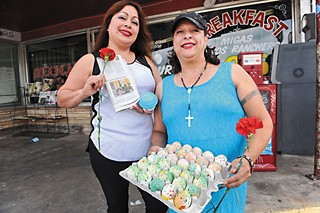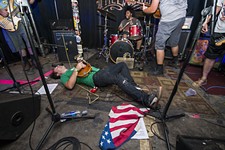No Chef Coats Here
Just 55 years of combined taco expertise
By Chase Hoffberger, Fri., June 13, 2014
It's hard to get a word in edgewise when you're sitting with two true legends of Tamale House No. 3. Outside a coffee shop in Hyde Park that's been around for the better part of three decades, everybody along the sidewalk wants to stop and say hello.
The first guy's in his 50s, and he's sorry for their loss. "At least you get a break," he says, smiling, his eyes kind from behind round wireframe glasses. He used to be a regular at the taco shop on Airport, the one flocked to en masse by damn near everyone who's ever lived in Austin. "It's harder to get up here since I moved south, but still once a week ...," he continues. "For 15 years, I'd come by every day."
Raquel Banda remembers him. She remembers every face. And she agrees with her old customer that it's nice to have a break. "That's the way I'm looking at it," she says. "I'm taking a break before I really get back into it."
Banda, 43, is talking about getting back into Tamale House, about getting back into the hot, small space on Airport, opening it up, and slinging tacos once again. Since the restaurant's beloved owner Robert Vasquez died in late April and the store subsequently shut down – a decision Banda expected but did not want to happen – she and her friend and longtime preparation-table cohort Shirley Trevino have spent their time trying to figure out a way to, as Trevino puts it, reopen the restaurant's doors "for Robert."
Together, Banda and Trevino logged 55 years working at Tamale House, give or take a couple short-lived times in which Trevino would take off. She's the one who got there first – having shown up in 1984. None of Vasquez's employees could speak any English then, she remembers, so she got to work the register. She moved to dishes a few years later, then joined Banda on the preparation table – they're the ones who threw the tacos together – when Banda was hired in 1989.
Both were beginning lives as mothers when they started, with Trevino's three kids all under 3 (she has a set of twins and another child born within that calendar year), and Banda needing Pampers for her daughter five years later.
"I said, 'I'm looking for a job,' and he said, 'Okay, what can you do?'" Banda remembers of her first interaction with the man she'd grow to call Dad. "I asked what he needed me to do." He told her he'd like her to start the next day.
Banda did, and through 25 years she learned the tenets of hard work, diligence, swift pace, and consistency. Vasquez taught his employees to work, and so in turn they worked quite often. Six days a week and every morning by 6am. Bring your kids if you need; they can sit at the table and eat tacos, drink soda for free. If you're sick, you take off, but if your car breaks down, he's grabbing you. Even in Kyle, where Banda moved recently. Fifty miles out of his way, for everybody in the restaurant.
"He was really thankful that you came to work," says Trevino. "At the end of the day: 'Thank you!' 'No, thank you, Robert.' He employed us!"
In return for their collective "passion for Tamale House," the shop got rewarded with a seemingly endless stream of customers – Austinites new and old who'd flock to an until-recently-undeveloped stretch of Airport Boulevard for both breakfast tacos and lunch at laughably low prices. "In the Eighties it was 45 cents," Trevino remembers, "then 65 cents and 85. Just recently, after 15 years, it went up to 95 cents. Not even a dollar!" The fixings, priced between 20 and 40 cents, were what kept Tamale House in business.
"I couldn't help but overhear," says a twentysomething named Monica, who approaches us because she misses Tamale House so much. Trevino calls her sweetie and asks about her favorites. They trade riffs on migas and chalupas, then Monica shyly moves away.
"We can't go anywhere without being recognized," says Trevino. "It's like Hollywood."
The next person walking by doesn't recognize them. He's a homeless guy named Ian who hangs around Hyde Park. Nice guy, wits about him and everything, but he'll ask you for your money ad nauseam.
"Sorry to interrupt," he says. "I can see that you're busy. I was just wondering if you could spare a little change."
Banda looks at him and smiles. "Oh my goodness," she says. "I don't have a job right now." Ian reminds her that his job is "walking around and asking for money from people." Banda says okay, and now Ian's on his way. "We'd give him a taco if he came up by Tamale House," Trevino clarifies. "'Here. Here's a rag,' we'd say. 'Wipe the tables for us.' We'd give that guy a taco."
That's what these two are after: reopening Tamale House – under a different name, likely, but in that building, and with Vasquez's recipes. "We could go back in there and get started again," says Trevino, acknowledging that there's no way they'd be able to open a restaurant there without getting certain amenities improved. (No. 3 got grandfathered in to current food and health standards.) "I just wish I had the funds."
Banda says Ron Meyeres, the vice president at Capital Leasing, Management & Sales Inc. which owns the building, is asking for $25,000 in improvements and a $2,500/month lease for the building. (Meyeres did not respond to the Chronicle's calls.)
What about the other one, I ask – the Tamale House on East Sixth Street, which Vasquez's sister Diana opened with her kids last year.
"That's something else," dismisses Banda. "It has nothing to do with Robert. Even though it's his sister, it's just not the same. He's given them the recipes, and they can't get it right."
Both said that they weren't offered jobs at Tamale House East, though two of the girls who worked for Vasquez did accept offers to switch over.
"They knew better than to ask me," stamps Trevino. "I wouldn't have gone over there."
The two hold no hard feelings over the closure, admitting full knowledge of Vasquez's plans to turn the restaurant's fate over to his family. But the two women are indebted to Vasquez, too, for "showing us a business," says Trevino, and giving them help when they needed it. "He used to say, 'I can close this place down and go fishing,' but he was always worried about us."
It makes the fourth visitor to our table that much more remarkable.
"Phyllis!" shouts Trevino, and she rises from her chair for greetings. She's talking about Phyllis Nunez, the owner of Duval Street Barbershop, a woman whose career path spans a similar track Banda and Trevino hope theirs to take. Nunez first started cutting hair at that location in 2000, when the place was still Gaitan's Barbershop, and owned by Pedro Gaitan. She was the first outside the Gaitan family to work there, assuming the lease on the space and changing its name when Gaitan retired in 2010.
"I hope they can make it work, and I think they can if they can get it open again," says Nunez when we catch up on the phone one week later. A native Austinite, she began frequenting Tamale House when it first opened in 1976, and knows well the value of customer loyalty. "We were able to make it because we have regulars, just like Tamale House."
Back at Quack's, Nunez offers parting encouragement to her partners in preservation.
"These are the kinds of places that we need to keep," she says. "This is what makes Austin. We can't allow people to come in and try to change things. We have to try to keep the places that have been here – like the Tamale House."









